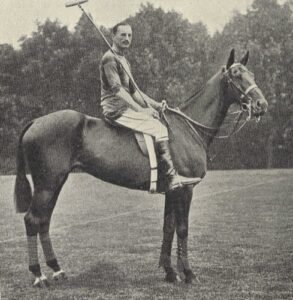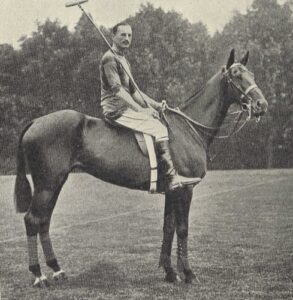The honorees are Joe Henderson, Jimmy Bachman, Jorie Butler Kent, Susan Stovall, and legendary horses Flash and Beatrice.
The 36th Annual Hall of Fame Induction Ceremony and Awards Dinner is one of the premier social events of the winter polo season in Florida and is scheduled for Friday, February 14, 2025, at 6:30 p.m. at the Museum of Polo.

Welcome to the Hall of Fame, Joe Henderson.
Henderson, who reached 8 goals outdoors and 10 goals in the arena, has won numerous major high-goaltournaments on grass, including the C.V. Whitney in 1987 as well as the America Cup twice and the North American Cup four times. He also dominated the 1987 Pacific Coast Open, winning the title while sweeping the MVP and BPP. In 1993, Henderson and Fish Creek reached the U.S. Open final, losing 11-10 to Gehache, while he was selected as the MVP.
Henderson was also a dynamic arena player, winning numerous titles en route to a 10-goal handicap while earning Arena Player of the Year in 1988 and 1992 and recognized as Arena Player of the Centennial Era in 1990.
Posthumous Hall of Fame inductee Jimmy Bachman had considerable success at all levels, winning the 20-goal Monty Waterbury Cup in 1983 and reaching the finals of both the 26-goal Sunshine League in 1985 and the 20-goal East Coast Open. He captured numerous medium-goal tournaments as well, including the Copper Cup (1987 and 1988), Bronze Trophy (1988 and 1989), the 1990 Heritage Cup and the 1991 Chairman’s Cup. But he made his name dominating low-goal polo, especially at Gulfstream in the 1980s.
Bachman reached 7 goals in 1986 and played at that handicap until his untimely death in 1991.
Iglehart Award recipient Jorie Butler Kent is an iconic figure in U.S. polo, born into the sport. Her father, Paul Butler, is synonymous with Oak Brook Polo and so is his daughter, who managed the club from 1967-1979, a first for a woman.
Butler Kent continued her interest in polo and, along with Sue Sally Hale and several others, became the first women to receive handicaps from the USPA in 1972. She also organized the USPA Polo Pony Championship and helped to establish the rules and registry. She continued to be a pioneer in the sport when she secured the first international corporate sponsorship – Rolex Watch.
Additionally, Butler Kent was integral to the early successes of many clubs, including Palm Beach Polo, Greenwich, and Windsor Polo in Vero Beach as well as the Museum of Polo.
The posthumous Iglehart Award honoree and “force of nature” Susan Stovall left an indelible mark on the world of polo, both as a pioneer for women’s polo and on the sport in general.
Stovall did it all – from riding early morning sets to competing on the field, to organizing tournaments, to entertaining royalty and celebrities at charity polo events.
She was a respected and much beloved manager of Eldorado for 26 years, while also continuing to play and continuing to help run her family’s polo operation, the White Swan Polo Club in Washington.
Under her watch Eldorado grew to become the largest polo club on the West Coasts with dozens of teams regularly competing thanks to her no-nonsense approach, organizing skills, enthusiasm and the genuine love for people that made them all feel welcome.
The Horses to Remember honoree of the early pre-Hartman era is Beatrice, who was a warrior on and off the polo field.
The little dark bay mare excelled in three International series for the U.S., ridden by two Hall of Famers, Dev Milburn (1924 Westchester Cup) and Winston Guest(1928 Cup of the Americas, 1930 Westchester Cup). She also played in the 1921 Westchester Cup for the British team.
Beatrice was also a real war hero. At the age of 16, she served as an artillery horse in the British Army, and was awarded a gold medal, which she wore pinned on her saddle pad while playing for the U.S. international team.
The phenomenal chestnut thoroughbred gelding Flash, whose actual name was Rockey Kid, will be recognized as “Horses to Remember, post-Hartman Award Era.”
In the 1970s, Flash helped several top players achieve tremendous victories. During the successful run of high-goal tournaments in Chicago in 1973, John Oxley purchased Flash along with the Linfoot string, greatly helping his players. Flash earned three Best Playing Pony awards played by Billy Linfoot, Roy Barry, and Corky Linfoot all in the same year.
Flash also competed in the Coronation Cups and Queens Cup in England. Among her many highlights was being named Horse of the Year for April 1976-April 1977 and featured on the cover of Polo Magazine.
Source: PoloHUB Read More
